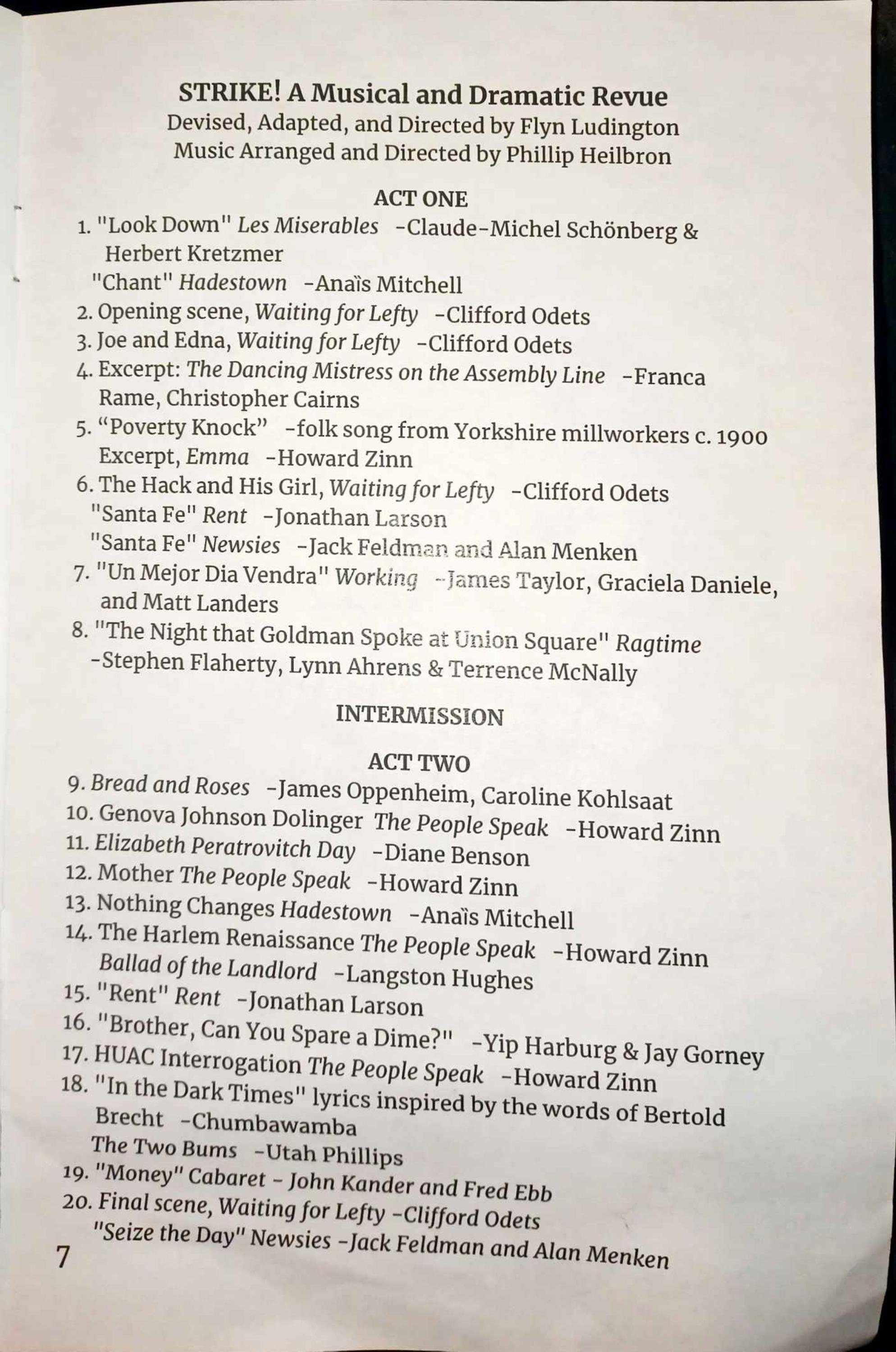Strike! The Musical - A Look Back
By MFC Feeley
When I booked my ticket for “Strike!” at the UAF Salisbury Lab Theater, I promised myself I would not write a review—like everyone else, I'm swamped at this time of year. But I loved it and wanted an excuse to talk to its creator and stage director, Flyn Ludington, about her inspiration.
Ludington conceived “Strike!” when the UAF Salisbury theater, which was scheduled to be closed for renovations in the Spring of 2025, suddenly became available.
“I was approached to devise and direct a sort of musical review, as it seemed like an easier thing to put together than a full production in the shorter amount of time we had.” Something like an impromptu workers’ strike, and just like those strikes, a lot is going on under the surface of “Strike!”
Workers' rights may seem like an odd topic for a musical review, but music has always played a role in collective movements. Ludington cites the marchers at Selma who sang as they crossed the bridge and Joe Hill, Industrial Workers of the World Organizer & Songwriter who transposed popular hymns into protest anthems, as examples of “the power of masses singing together.” Just as the labor movement was a group movement, “Strike!” is an ensemble work and at its most thrilling when the whole cast is involved. Standouts include “Poverty Knock,” sung by a group of sweatshop workers who mime their endless time at the sewing machine, and the hysterical yet horrifying “Dancing Mistress on the Assembly Line,” wherein workers learn to operate machinery gracefully, while hopefully not losing any limbs. Ironically, no, make that tellingly, one of the most moving moments comes late in the show when Faith Burns sings “Brother Can You Spare a Dime” as one by one the whole ensemble turns away. It’s too late to see the show, but I hope everyone who has seen it will tell their friends about it. If you cannot experience it vicariously, I’d suggest making a playlist from the program.
Ludington’s passion for the material is obvious. She says she “was radicalized by history, and therefore always on the lookout for injustice.” Her mother hailed from Butte, Montana, where a union member was hanged from a bridge. Her paternal grandfather helped start Fairbanks's first food service union in the 1940s. Ludington joined the Industrial Workers of the World in 2012. The IWW, which formed in Chicago in 1905 to fight the fight for the eight-hour day, was started by women, people of color, and immigrants. It was the first union to accept women and wanted to combat corruption even in other unions: all themes that play out in “Strike!”
An educator at heart, Ludington did not want to indoctrinate anyone, but did want to show the power of collective action coupled with “the perseverance of the human spirit.” Despite recent labor activism at UAF, for example, the Graduate Student Workers unionization last year, Ludington expected to encounter some resistance to the subject matter. However, one of the biggest surprises for her was that “so many young people who understood immediately what we were trying to say—they didn’t always know the history, but they related to the desire to speak truth to power.” This enthusiasm, so evident in the production, spread off stage with much of the cast and crew becoming more active in their respective communities. In fact, so many actors were eager to come to every rehearsal that the production morphed from a series of individual pieces into a truly group effort.
“Initially, I was going to save that ensemble power for the finale, but then I was able to use it throughout the show.” Nearly every song became an ensemble piece. Even the intimate and moving dramatic scenes benefit from the other cast members on stage.
When asked if she felt any compunction about being the director, or boss, of a show about resisting power, Ludington admitted that it could be tricky but took the opportunity to give credit to the cast, crew, and musical director Phillip Heilbron all of whom made the production exceed anything she could have envisioned independently.
“The workers do make it all possible.”
For more of Flyn Ludington’s directorial magic, be sure to catch The Fairbanks Shakespeare Company’s production of As You Like It this summer.


